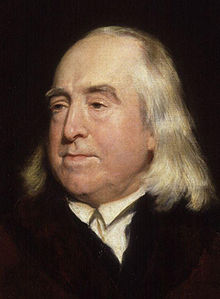Utilitarismus
Dr Utilitarismus (lat. utilitas, Nutze, Vordäil) isch e wärtendi (normativi) Form vo dr zwäckorientierte (teleologische) Ethik, wo in verschiidene Wariante vorchunnt. Näbe dr Ethik isch er au in dr Sozialfilosofii und in de Wirtschaftswüsseschafte vo Bedütig.

D Baasis, für wie e Handlig im ene utilitaristische Raame ethisch bewärtet wird, isch s Brinzip vom Nutze. D Grundformle vo däm isch, ass e Handlig oder e Reegle im sittlige bzw. moralische Sinn guet und richdig isch, wenn iiri Folge für s Wool vo dene, wo vo dr Handlig betroffe si, optimal si. Bi dr hedonistische Form vom Utilitarismus isch mit em Wool vo allne s Glück vo de äinzelne gmäint und s chunnt uf d Maxime uuse, ass mä eso söll handle, ass s grösstmööglige Maass an Glück entstoot. Das isch s Brinzip vom maximale Glück, uf Änglisch maximum-happiness principle. Wemm mä s allgemäine Glück as Aggregazioon vom Glück vo de äinzelne Indiwidue uffasst, denn isch dr Utilitarismus en eudaimonistischi Ethik. Wil möögligi Folge und reali Wirkige zentral si drbii, wie e Handlig beurdäilt wird, isch dr Utilitarismus au e konsekwenzialistischi Ethik. Es handlet sich bim Utilitarismus au um e altruistischi und uniwersalistischi Moraltheorii, denn er will, ass es dr Allgemäinhäit immer besser gieng.
Dr utilitaristischi Aasatz isch vor allem vom Jeremy Bentham (1748–1832) und vom John Stuart Mill (1806–1873) süstematisch entwigglet worde und si häi en au bi konkrete Frooge aagwändet. Dr Bentham het dr zentral Begriff vom Nutze im erste Kapitel vo sinere „Introduction to the Principles of Morals and Legislation“ (zerst erschiine 1789, im Joor vo dr Franzöösische Revoluzioon) eso beschriibe:
- „Mit em Brinzip vom Nutze isch gmäint, ass mä jedi Handlig befürwortet oder ableent je noch däm, öb si s Glück vo alle, wo vo dr Handlig beiiflusst wärde, vergröösseret oder verchliineret […] Mit ‚Nutze‘ isch die Äigeschaft vom ene Objekt gmäint, wo s wägen ere drzue tendiert, Guets wie Vordäil, Fröid, Glück oder Wool z schaffe.“
„Nutze“ (benefit) isch also nit s Gliiche wie „Nützligkäit“ (utility). Modärni utilitaristischi Theorie verwände au no dr Begriff vo dr Preferänz.
Litratuur
ändere- Catherine Audard: Anthologie historique et critique de l’utilitarisme. Presses Universitaires de France, 1999, ISBN 978-2-13-049599-4.
- Jeremy Bentham: An introduction to the principles of morals and legislation. Kessinger, 2005, ISBN 1-4179-5732-8 (HTML).
- Alain Caillé: Critique de la raison utilitaire, Bariis 1989
- John Stuart Mill: Der Utilitarismus. Reclam, Stuttgart 1976, ISBN 3-15-009821-1.
- Peter Singer: Praktische Ethik. 2. üb. Auflage. Reclam, Stuttgart 1994, ISBN 3-15-008033-9.
- Otfried Höffe: Einführung in die utilitaristische Ethik: Klassische und zeitgenössische Texte. 2. überarbeitete Auflage. Francke, Tübinge 1992, ISBN 3-7720-1690-1.
- Jack Nasher: Die Moral des Glücks. Eine Einführung in den Utilitarismus. Duncker & Humblot, Berlin 2009, ISBN 978-3-428-12877-8.
- Bernward Gesang: Eine Verteidigung des Utilitarismus. Reclam, Stuttgart 2003, ISBN 3-15-018276-X.
Weblingg
ändere- Iidraag im Rudolf Eisler Lexikon
- Nutzenkalküle in liberalen Wirtschaftsschulen (.pdf) (165 kB)
- Utilitarismus – Kritik und Neubegründung
- Jörg Schroth: Utilitarismus und Verteilungsgerechtigkeit (Zeitschrift für philosophische Forschung 60 (2006), S. 37–58)
| Dä Artikel basiert uff ere fräie Übersetzig vum Artikel „Utilitarismus“ vu de dütsche Wikipedia. E Liste vu de Autore un Versione isch do z finde. |